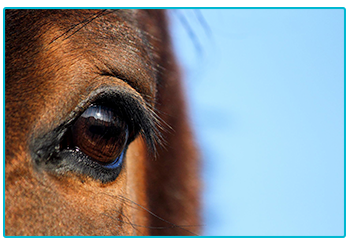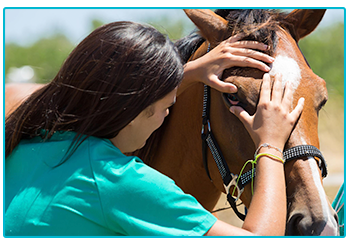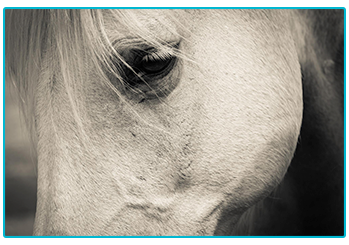This time of year marks the middle of eventing season and perhaps one of the best times to get out and about on your horse. The more that you and your four-legged friend are enjoying the great outdoors, the more you might want to think about any possible health issues that could affect them. One of these might be equine recurrent uveitis (ERU), otherwise known as moon blindness, which is the most common cause of equine blindness in the world. At The Insurance Emporium, we want to help you keep your steed fit and well, so we asked our horse health expert for some advice on moon blindness.

What is it?
Uveitis occurs when the uveal tract, including the iris and structures surrounding the lens, become inflamed and cause significant discomfort for your horse. Recurrent uveitis is associated with repeated episodes of inflammation, which can cause permanent changes to the eye such as cataracts. Typically, only one eye is affected by this but it can cause permanent loss of sight.

What causes it?
The underlying cause of this ailment has been linked to an autoimmune process, where the body’s immune system ‘attacks’ itself. Various triggers may be associated with the condition and several different factors are thought to be involved. Infectious causes, such as Lepospira, and non-infectious causes, such as allergies, may be involved. Certain breeds are more prone to developing the condition, for example Appaloosas and Warmbloods.
What are the symptoms?
Symptoms include ocular discomfort, such as closing and rubbing the eye, swelling of the conjunctiva or eye lids, cloudiness and ‘blue tinge’ to the eye, a constricted pupil, redness around the eye, sensitivity to light and clear ocular discharge. If your horse displays any signs of ocular pain it is important that you contact your vet immediately, even if it is outside of surgery hours. Prompt treatment is critical!

How is it treated?
Eye problems can require careful management and often require intensive medical treatment. This usually requires the frequent application of eye drops. Implants and surgery can also be used to manage recurrent uveitis. Removal of the eye may need to be considered in cases that respond poorly to treatment. There are certain steps that you can help protect your horse, for instance keeping them in plenty of shade and away from bright sunlight. Also, using a fly mask could be important as flies spread infection and can make your horse’s eyes sore.
If you suspect that your horse could be suffering from moon blindness, time is really of the essence and prompt treatment could prove vital. This means that knowing the symptoms and acting quickly could help to minimise the effects of this ailment on your horse. Keeping a watchful eye on your steed’s health is always a good idea and it’ll hopefully help contribute to you both enjoying your adventures together for years to come!
All content provided on this blog is for informational purposes only. We make no representations as to the accuracy or completeness of any information on this site or found by following any link on this site. We will not be liable for any errors or omissions in this information nor for the availability of this information. We will not be liable for any loss, injury or damage arising from the display or use of this information. This policy is subject to change at any time.


